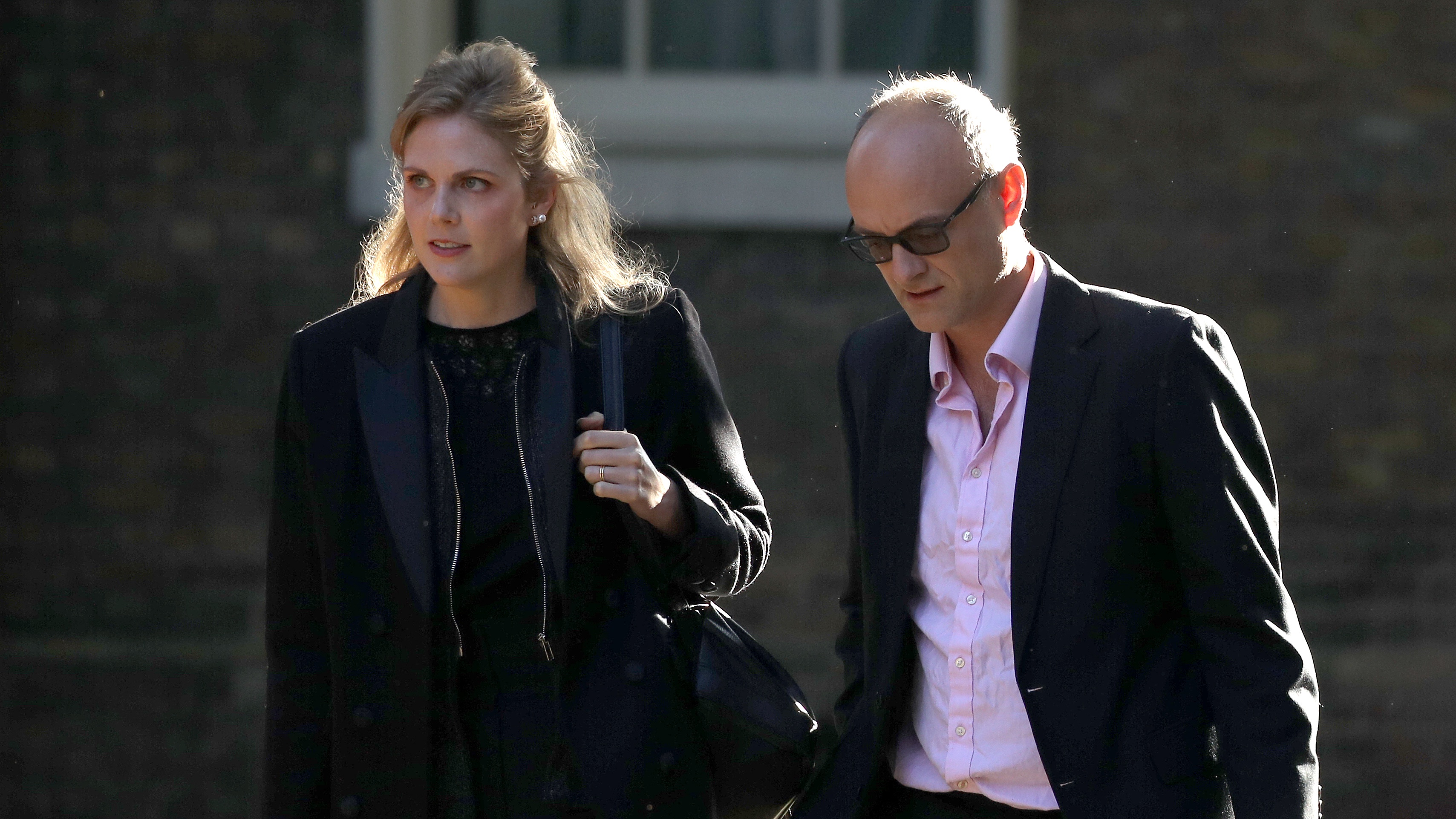‘Hard rain’s gonna fall’: what are Dominic Cummings’ plans to reform the civil service?
War on Whitehall begins as PM’s closest adviser moves his team into Cabinet Office

A free daily email with the biggest news stories of the day – and the best features from TheWeek.com
You are now subscribed
Your newsletter sign-up was successful
Dominic Cummings has launched his long-awaited Whitehall reshuffle, relocating 10 Downing Street’s top team to a new “control centre” in the Cabinet Office’s current home at 70 Whitehall.
According to a “senior government source”, Boris Johnson’s right-hand man and around 20 other political officials including Downing Street policy unit director Munira Mirza will be based in the new open-plan office in the neighbouring building, the i news site reports.
The move comes days after Johnson ally Simon Case was appointed head of the civil service and appears to be the first drop in Cummings’ promised “hard rain” for the “incoherent” Cabinet Office. So what else does he have planned?
The Week
Escape your echo chamber. Get the facts behind the news, plus analysis from multiple perspectives.

Sign up for The Week's Free Newsletters
From our morning news briefing to a weekly Good News Newsletter, get the best of The Week delivered directly to your inbox.
From our morning news briefing to a weekly Good News Newsletter, get the best of The Week delivered directly to your inbox.
What’s his issue with Whitehall?
Cummings has long been an outspoken critic of the civil service, calling the concept “an idea for history books” and proposing the abolition of the role of permanent secretaries.
The senior adviser has also claimed in the past that the Cabinet Office, which serves as the corporate headquarters of the civil service, is “often used to limit the autonomy of individual ministers and impose the will of senior mandarins”, the i says.
Last year, he “proposed a major overhaul” of the system, with experts “operating next to, and in some senses above, the Cabinet Office”, the news site adds.
A free daily email with the biggest news stories of the day – and the best features from TheWeek.com
Civil servants have been warned that the proposed reforms are designed to “drive culture change”, reports The Times. In January, Cummings offered a hint of what was to come when when he called for “super-talented weirdos” to apply to work at 10 Downing Street.
“What SW1 needs is not more drivel about ‘identity’ and ‘diversity’ from Oxbridge humanities graduates but more genuine cognitive diversity,” the job post said.
So what exactly are his plans?
The shifting of policy advisers out of Downing Street and into the Cabinet Office appears to be the first major offensive in what commentators are describing as the “war” on the Whitehall being spearheaded by Cummings and Johnson.
The new workspace has been described by the Cabinet Office as a “collaboration hub”, but The Times claims the move will “in effect create a de facto ‘Department for the Prime Minister’ at the heart of Whitehall, with officials working under far closer political direction than ever before”.
The door that currently connects 70 Whitehall to 10 Downing Street is also “being removed in a symbolic move that unites the two office complexes”, adds the i site.
Cummings’s machinations have already forced the hands of a number of senior civil servants, with five major departures this year alone.
Mark Sedwill announced in June that he was stepping down as cabinet secretary, amid reports of clashes with Cummings. And Jonathan Slater was removed from the post of permanent secretary at the Department of Education last week, following the controversy surrounding this year’s A-levels and GCSEs.
A further three permanent secretaries have also resigned in recent months: the Home Office’s Philip Rutnam, the Foreign and Commonwealth Office’s Simon McDonald and Richard Heaton from the Ministry of Justice.
What do critics say?
Concerns have been raised over the hastiness and perceived brutality of the shake-up, along with fears that Cummings is attempting to politicise the civil service.
Some critics have suggested that Cummings is leading a “rapid, and dangerous, politicisation of the traditionally independent and non-partisan administrative machine”, reports The Independent’s associate editor Sean O’Grady.
And in article in The Guardian last month, an anonymous civil servant wrote that the reforms represent “a threat to democracy itself”.
Liberal Democrat leader Ed Davey has also spoken out against the war on the Cabinet Office, claiming that the PM is “clearly ready to grant Cummings his every wish when it comes to politicising the civil service and sweeping out those who may try to hold his government to account”.
Meanwhile, the general secretary of the FDA trade union, which represents senior civil servants, has warned that Johnson’s allies are exhibiting a “fundamental misunderstanding” of the modern civil service.
“If it wasn’t clear before, then it certainly is now – this administration will throw civil service leaders under a bus without a moment’s hesitation to shield ministers from any kind of accountability,” FDA boss Dave Penman continued.
“After this government’s continuous anonymous briefings to the press, trust between ministers and civil servants is already at an all-time low and this will only damage it further.”
-
 How the FCC’s ‘equal time’ rule works
How the FCC’s ‘equal time’ rule worksIn the Spotlight The law is at the heart of the Colbert-CBS conflict
-
 What is the endgame in the DHS shutdown?
What is the endgame in the DHS shutdown?Today’s Big Question Democrats want to rein in ICE’s immigration crackdown
-
 ‘Poor time management isn’t just an inconvenience’
‘Poor time management isn’t just an inconvenience’Instant Opinion Opinion, comment and editorials of the day
-
 How corrupt is the UK?
How corrupt is the UK?The Explainer Decline in standards ‘risks becoming a defining feature of our political culture’ as Britain falls to lowest ever score on global index
-
 The high street: Britain’s next political battleground?
The high street: Britain’s next political battleground?In the Spotlight Mass closure of shops and influx of organised crime are fuelling voter anger, and offer an opening for Reform UK
-
 Is a Reform-Tory pact becoming more likely?
Is a Reform-Tory pact becoming more likely?Today’s Big Question Nigel Farage’s party is ahead in the polls but still falls well short of a Commons majority, while Conservatives are still losing MPs to Reform
-
 Asylum hotels: everything you need to know
Asylum hotels: everything you need to knowThe Explainer Using hotels to house asylum seekers has proved extremely unpopular. Why, and what can the government do about it?
-
 Taking the low road: why the SNP is still standing strong
Taking the low road: why the SNP is still standing strongTalking Point Party is on track for a fifth consecutive victory in May’s Holyrood election, despite controversies and plummeting support
-
 Behind the ‘Boriswave’: Farage plans to scrap indefinite leave to remain
Behind the ‘Boriswave’: Farage plans to scrap indefinite leave to remainThe Explainer The problem of the post-Brexit immigration surge – and Reform’s radical solution
-
 ‘Peak consumption has become the Holy Grail of the energy debate’
‘Peak consumption has become the Holy Grail of the energy debate’Instant Opinion Opinion, comment and editorials of the day
-
 Are we facing a summer of riots?
Are we facing a summer of riots?Today's Big Question Anti-immigrant unrest in Essex has sparked fears of a summer of disorder